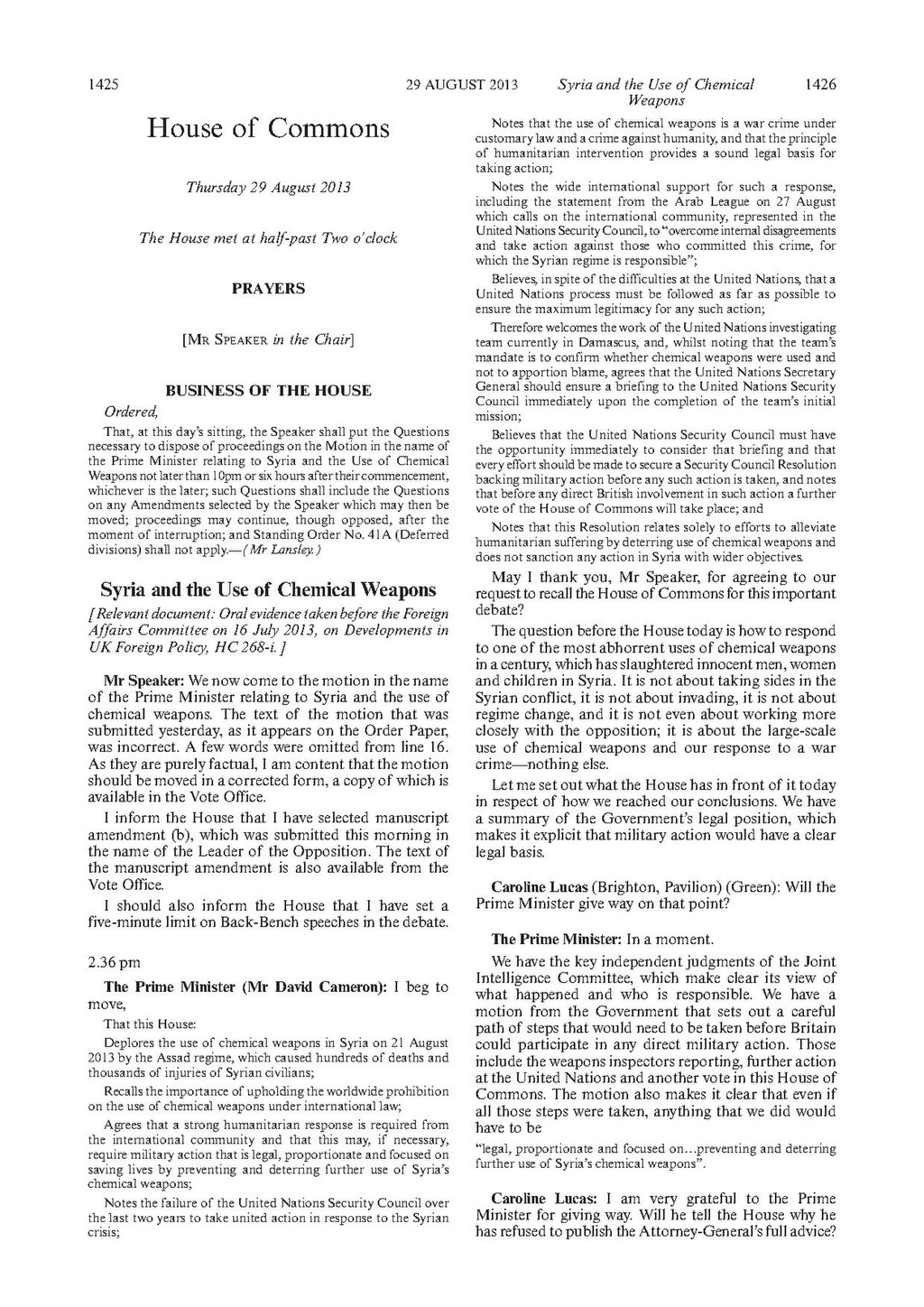House of Commons
Thursday 29 August 2013
The House met at half-past Two o’clock
PRAYERS
[Mr Speaker in the Chair]
BUSINESS OF THE HOUSE
Ordered,
That, at this day’s sitting, the Speaker shall put the Questions
necessary to dispose of proceedings on the Motion in the name of
the Prime Minister relating to Syria and the Use of Chemical
Weapons not later than 10pm or six hours after their commencement,
whichever is the later; such Questions shall include the Questions
on any Amendments selected by the Speaker which may then be
moved; proceedings may continue, though opposed, after the
moment of interruption; and Standing Order No. 41A (Deferred
divisions) shall not apply.—(Mr Lansley.)
Syria and the Use of Chemical Weapons
[Relevant document: Oral evidence taken before the Foreign Affairs Committee on 16 July 2013, on Developments in UK Foreign Policy, HC 268-i.]
Mr Speaker: We now come to the motion in the name of the Prime Minister relating to Syria and the use of chemical weapons. The text of the motion that was submitted yesterday, as it appears on the Order Paper, was incorrect. A few words were omitted from line 16. As they are purely factual, I am content that the motion should be moved in a corrected form, a copy of which is available in the Vote Office.
I inform the House that I have selected manuscript amendment (b), which was submitted this morning in the name of the Leader of the Opposition. The text of the manuscript amendment is also available from the Vote Office.
I should also inform the House that I have set a five-minute limit on Back-Bench speeches in the debate.
2.36 pm
The Prime Minister (Mr David Cameron): I beg to move,
That this House:
Deplores the use of chemical weapons in Syria on 21 August 2013 by the Assad regime, which caused hundreds of deaths and thousands of injuries of Syrian civilians;
Recalls the importance of upholding the worldwide prohibition on the use of chemical weapons under international law;
Agrees that a strong humanitarian response is required from the international community and that this may, if necessary, require military action that is legal, proportionate and focused on saving lives by preventing and deterring further use of Syria’s chemical weapons;
Notes the failure of the United Nations Security Council over the last two years to take united action in response to the Syrian crisis;
Notes that the use of chemical weapons is a war crime under customary law and a crime against humanity, and that the principle of humanitarian intervention provides a sound legal basis for taking action;
Notes the wide international support for such a response, including the statement from the Arab League on 27 August which calls on the international community, represented in the United Nations Security Council, to “overcome internal disagreements and take action against those who committed this crime, for which the Syrian regime is responsible”;
Believes, in spite of the difficulties at the United Nations, that a United Nations process must be followed as far as possible to ensure the maximum legitimacy for any such action;
Therefore welcomes the work of the United Nations investigating team currently in Damascus, and, whilst noting that the team’s mandate is to confirm whether chemical weapons were used and not to apportion blame, agrees that the United Nations Secretary General should ensure a briefing to the United Nations Security Council immediately upon the completion of the team’s initial mission;
Believes that the United Nations Security Council must have the opportunity immediately to consider that briefing and that every effort should be made to secure a Security Council Resolution backing military action before any such action is taken, and notes that before any direct British involvement in such action a further vote of the House of Commons will take place; and
Notes that this Resolution relates solely to efforts to alleviate humanitarian suffering by deterring use of chemical weapons and does not sanction any action in Syria with wider objectives.
May I thank you, Mr Speaker, for agreeing to our request to recall the House of Commons for this important debate?
The question before the House today is how to respond to one of the most abhorrent uses of chemical weapons in a century, which has slaughtered innocent men, women and children in Syria. It is not about taking sides in the Syrian conflict, it is not about invading, it is not about regime change, and it is not even about working more closely with the opposition; it is about the large-scale use of chemical weapons and our response to a war crime—nothing else.
Let me set out what the House has in front of it today in respect of how we reached our conclusions. We have a summary of the Government’s legal position, which makes it explicit that military action would have a clear legal basis.
Caroline Lucas (Brighton, Pavilion) (Green): Will the Prime Minister give way on that point?
The Prime Minister: In a moment.
We have the key independent judgments of the Joint Intelligence Committee, which make clear its view of what happened and who is responsible. We have a motion from the Government that sets out a careful path of steps that would need to be taken before Britain could participate in any direct military action. Those include the weapons inspectors reporting, further action at the United Nations and another vote in this House of Commons. The motion also makes it clear that even if all those steps were taken, anything that we did would have to be
“legal, proportionate and focused on…preventing and deterring further use of Syria’s chemical weapons”.
Caroline Lucas: I am very grateful to the Prime Minister for giving way. Will he tell the House why he has refused to publish the Attorney-General’s full advice?
